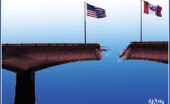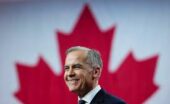Johannah Bernstein post: "eternally proud of my father’s extraordinary aeronautical engineering. legacy. here is a photo of the Canadair Water…
Wednesday Night #1950
Written by Diana Thebaud Nicholson // July 31, 2019 // Wednesday Nights // Comments Off on Wednesday Night #1950
One of the last of the Expo leadership team, Yves Jasmin, for whom I worked in my first years at Expo and who post-Expo became a dear friend, has died. He led a rich life which is highlighted in the charming tribute by Shawn Rosengarten with whom he shared a unique friendship
Appreciation: In 1967, Yves Jasmin made Montreal go viral
As head of public relations for Expo 67, Yves Jasmin, who died last week at age 97, grabbed the world’s attention.
Friends of Yves Jasmin will gather at the former Jamaican Pavilion near the Casino on Île-Notre-Dame on Wednesday, July 31 from 3:30 p.m. to 7:30 p.m.
Still recovering from last Wednesday, which at minimum could be termed lively. It was a joy to have the Singapore family – Marc, Jean, Maya and Tebo – with us and fun to hear their respective views of the Singapore Salon, the successfully monetized successor to our Wednesday Night. One guest enthused that “Marc has created a unique Montreal export with his Club in Singapore … a Cirque of the Mind!”
Robert Mueller‘s appearances before two congressional committees generated immediate disappointment around the Wednesday Night table, reflecting much of the media coverage. You have all read it, but may have missed the more sympathetic and light-hearted review by Robert De Niro citing his training as a method actor: ‘I would have channeled my inner rage’ .
When the topic turned to Donald Trump and racism, the SRO crowd greeted the lone Trump supporter with some astonishment and great skepticism, clearly convinced that a number of his arguments regarding IQ measurement and related matters were based on highly questionable, dare we say, “alternative facts”? One guest pointed out that “quoting those statistics about race and IQ demonstrated a very fundamental error — trying to claim that correlation has something to do with causation. It’s not surprising that his background is in economics, where this approach can be beneficial in making trading decisions.”
Trump, of course, continued to play the race card for the remainder of the week with his unprovoked attack on Rep. Elijah Cummings and his Baltimore district. That hasn’t ended all that well, as unwanted attention has been drawn to conditions in Jared Kushner’s properties in Baltimore, and The president’s restaurants, resorts, and golf clubs have had some, shall we say, problematic sanitary records
Bloomberg Politics comments: Donald Trump is signaling loud and clear that sowing racial division will be a part of his re-election strategy. The question is whether Democrats can capitalize on that gambit to deny the president a second term.
Did you watch Tuesday’s Debate? Early reaction from the NYT Sanders and Warren Battle Accusations of ‘Fairy Tale’ Promises as Intraparty Rift Flares. “Though each is seen as the other’s chief obstacle in the Democratic race, Mr. Sanders and Ms. Warren did not at any point clash directly. Instead, they battled an array of comparatively obscure candidates who used the debate as an opportunity — and for some of them, likely a last chance — to express alarm about their party’s embrace of immense liberal policy goals, like the creation of a “Medicare for all”-style health care system, Mr. Sanders’s No. 1 issue, and a broad liberalization of the immigration system.” It will be a great relief when a number of those relatively obscure candidates drop out (Debate May Be Last Ditch Effort For Struggling Democrats To Stay Alive
With more stringent qualification rules from the Democratic National Committee set to severely limit who will make the debate stage in September, lower-tier candidates are now facing a do-or-die moment …
Currently, only a quarter of the 24 candidates in the field qualify for the September debate in Houston. Several are on pace to potentially make it by the end of an August deadline, but it’s looking increasingly likely that there will be less than 10 candidates who will make the stage. As of now, the six candidates who meet the requirements for September are: former Vice President Joe Biden, Vermont Sen. Bernie Sanders, Massachusetts Sen. Elizabeth Warren, California Sen. Kamala Harris, Sound Bend, Ind., Mayor Pete Buttigieg and former Texas Rep. Beto O’Rourke.
CBC was particularly taken with Elizabeth Warren’s statement “I don’t understand why anybody goes to all the trouble of running for president of the United States just to talk about what we really can’t do and shouldn’t fight for.”
Politico comments ” “It wasn’t exactly an invigorating evening. It was too long (closing in on 2 hours, 45 minutes) and too disorienting (candidates clamoring to be heard; moderators laboring with impatient “thank yous” to shut down answers that went over time) for that. “But in its discursive way it was illuminating: The debate showed a party arguing seriously about the inherent tension between boldness and realism, passion and prudence, on such topics as improving health care, immigration, taking on wealthy interests, and the best way broadly to energize average voters.”
Analysis will be more complete following Wednesday’s debate featuring Biden, Harris and Booker.
Writing in Policy Magazine, Jeremy Kinsman delivered an up-beat report on his recent visit to Moscow Letter from Moscow. However, his favourable impression was immediately undermined on Saturday when Hundreds [were] arrested at Moscow demonstration for free elections amid suspicions that opposition leader Alexei Navalny may have been poisoned while in jail. Deutsche Welle’s opinion piece The Kremlin fears its own people is a good summary.
In his most recent CTV Diplomatic community appearance, Jeremy turned his focus on U.S. – China trade relations – Will there be a deal before the 2020 election? He is not optimistic and warns that Canada is caught in the middle until and unless the government solves the problem of senior Huawei executive Meng Wanzhou’s extradition to the U.S. China is preoccupied with the situation in Hong Kong Playing for time: China, Hong Kong and its deepening protests
15 Days of Fury: How Puerto Rico’s Government Collapsed
Simmering frustrations over disaster response, a weak economy and graft scandals turned into mass protests that toppled Gov. Ricardo Rosselló
His dramatic ouster, and the furious rejection of the corruption that Puerto Ricans perceive as deeply rooted in their government, shook the island to its core and challenged a long-entrenched political system. All the more remarkable was that the people who made it happen came from outside the establishment that, until now, comfortably ruled this island of 3.2 million. See also: The Many Roots of Puerto Rico’s Crisis
There is serious concern over the promised orderly transition following the Governor’s departure on Friday. By law, the island’s secretary of state should be the one to succeed Rosselló. However, no one has been confirmed to assume the position since Luis G. Rivera Marín, who was part of the chat scandal that led to Rosselló’s ouster, submitted his resignation July 13. Justice Secretary Wanda Vázquez is next in line. But on Sunday, Vázquez slightly shifted her narrative on Twitter, urging Rosselló to “identify and submit a candidate for the position of Secretary of State before August 2” because she has “no interest in occupying the position of Governor.” If Rosselló doesn’t name a secretary of state and Vázquez refuses to step in as governor, the next person in line is Puerto Rico’s 31-year-old treasury secretary, Francisco Parés. But he would be unable to take over because the Puerto Rican constitution requires the governor to be at least 35. And the list goes on. Nobody, it seems, wants the job.
Changing Canadian election date?
While struggling with mightier questions, I missed the story about the request to change the date of this year’s federal election in order to accommodate Orthodox Jewish voters on an important Jewish holiday called Shemini Atzeret, following the festival of Sukkot. Chani Aryeh-Bain, who is running for the Conservatives in the riding of Eglinton-Lawrence, brought forward the legal challenge. She previously told Global News the holiday impacts her and approximately 75,000 orthodox Jews across the country.
“Shemini Atzeret restricts me from doing a lot of things,” Aryeh-Bain explained (complained?).
“We can’t drive, we can’t work, we can’t vote, we can’t use the phone, the computers, so a lot of things that need to be done on an election day I can’t do.”
Chief electoral officer Stephane Perrault’s detailed decision says it is not in the public interest to move voting day. Perrault acknowledged that two of the advance polling days conflict with either the Sabbath (which begins at sunset on October 11 and ends at sunset on October 12) or the first day of the festival of Sukkot, which begins at sunset on Sunday, October 13 and continues on the advance polling day of Monday, October 14. However, he argues that outside of election day and advanced polls, all voters — including observant Jews — can vote by special ballot on any day from the election call to Oct. 15.
At 400th anniversary of representative government, Trump will address General Assembly, others will talk about the future
… two marquee events in the 2019 Commemoration, a statewide series of activities that reflects on key events in the development of the United States that took place four centuries ago — among them the first meeting of a representative legislature in English North America and the arrival of the first enslaved Africans.
On Wednesday, the only day the forum is open to the public, there are panels and discussions dedicated to diversity, the balance between majority rule and minority rights, rule of law, civic education and other topics … Wednesday’s sessions will feature a range of panelists, including former Secretary of Defense Robert Gates, philanthropist David Rubenstein and law professor and legal commentator Jeffrey Rosen. Other speakers include former House Majority Leader Eric Cantor, former Governor George Allen and Rep. Bobby Scott. Journalists such as Andrea Mitchell and Ann Compton will serve as panel moderators.
Wanda Potrykus advises that the Community Events summer concert series, from 2 pm to 4 pm on Sundays in Westmount Park, is coming to a close. There is one last concert offering on the calendar: August 11, 2019 – Words and Music. “an increasing number of Westmount’s summer concert audience are finding they quite like the poetry vibe and the occasional short story mixed with an ever increasing and eclectic variety of musical styles and musical instruments on offer: First Nations, Caribbean, folk, Middle Eastern, Sufi, South Asian, rap, all produced on a wide range of instruments including, drums of all kinds, Irish whistle, hammer dulcimer, violin, cello, oud, guitars of all sorts, and sometimes just the magic of the voice itself, as in the throat singing, rap and a cappella voices that have all been presented in recent years. Words and Music indeed. It is well-named.”
Varia
Better Than Good Enough
Donald Johnston‘s essay in Policy Magazine is a welcome note of optimism and praise of Canada: “Of Canada, a country of elephantine proportions, many of us have impressions of particular regions, cities and people, but very few know it in much detail from sea to sea to sea. With some exceptions, most Canadians of my generation could be likened to blind men describing an elephant. At the same time, many academics, students, journalists, workers in national businesses, in government bureaucracies, in the military and the RCMP, to name a few, do have opportunities not only to work in many areas of Canada, but to live in them. Even with the distance-obliterating power of the internet, it’s day-to-day living that gives one a true sense of people, their values and cultures.”
Rodrigue Tremblay has published a new article, Financial Capitalism Gone Amok: Ultra-low Interest Rates and Price Bubbles“. See http://rodriguetremblay100.blogspot.com
Who’s employed by the lifestyles of the rich and famous?
Not just a sign of our unequal times, wealth work is important both because it is now a significant feature of urban economies and because it presages at least one vision of the “future of work” at a time when society is wondering what such “new work” will look like.
… The problem, on the downside, is the poor, even dystopian, quality of wealth work and what that may presage. The growth of wealth work, after all, looks mostly to mean more job growth at the lower end of the pay spectrum, among jobs paying no more than $30,000 or $40,000 a year. In theory, other jobs that automation and AI generate in the future will be higher-paying and more secure. As it stands now, though, wealth work remains one of the largest and fastest-growing categories of “new work,” which does not appear a very secure or promising domain of labor in Rugaber’s story. With pay at just $25,000 a year, non-farm animal caretaking (think dogwalking) may be a good way to earn a little money, but if the fastest-growing segment of the non-college job market continues to revolve around menial tasks involving the care and feeding of the rich it’s hard to see how large numbers of workers will maintain decent livelihoods, accumulate skills to move into higher-paying employment, and retain their dignity and commitment to democracy.
On Tuesday evening, CBC Radio’s Ideas featured a rebroadcast of the thoughtful Five Freedoms: Freedom from Lies with with journalists Susan Ormiston and Desmond Cole, and writer Linda McQuaig.
“Freedom of the press is supposedly a defining feature of Western societies, and journalists are generally under the impression that their job is to give us the facts about what’s happening in the world. There’s a lot of lip service to this ideal, but in an era of fake news, post-truth and a 24-hour news cycle, what are journalists to hang onto?
“Where might you find the truth anyway, and who might tell it to you? And does your editor, your paper, your producer, have your back?”
While no system can be absolutely fair as well as serving the needs of the population, the recent actions of some medical schools would appear to be sensible: In a push for diversity, medical schools overhaul how they select Canada’s future doctors. “”The drive to consider racial and socio-economic equality in admissions is also leading major changes in the U.S. college system. The College Board now includes what’s being called an adversity score in SAT test results based on demographic factors such as crime and poverty levels in a student’s neighbourhood and school district. The board said it could no longer ignore the extent to which differences in wealth and race were reflected in test scores, which are very influential in the admissions process. The method for calculating the score has not been released, but it’s based on public information, not answers submitted by students.” Comments anyone?
Amazing story:
Chaser, the border collie that could recognize more than 1,000 words, has died Psychologist John W. Pilley used toys to train the border collie known as ‘the world’s smartest dog’ and published his findings in the journal Behavioural Processes in 2011. The best thing about this story is that Chaser was also a beloved pet who had a great life.



